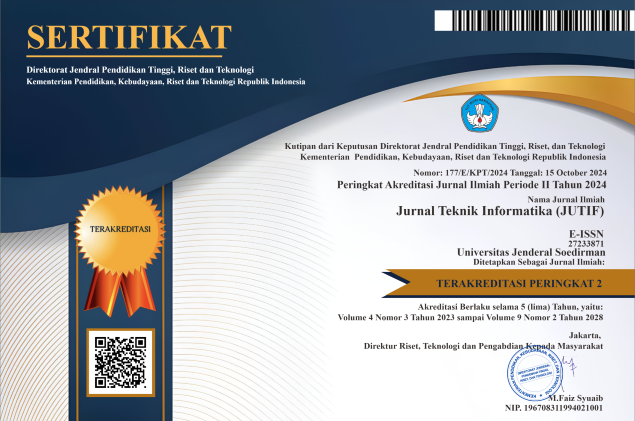WALLET-BASED AUTHENTICATION ON COLLEGE INFORMATION SYSTEM
DOI:
https://doi.org/10.20884/1.jutif.2022.3.5.473Keywords:
Authentication, Blockchain, Role-Based Access Control, WalletAbstract
Since the widespread use of cryptocurrency, blockchain technology start to be adapted in various applications. Some businesses are already adopting blockchain technology because of its advantages such as data integrity and privacy. One of them is Web 3.0. Web 3.0 puts forward data decentralization so that users can choose what data will be sent to the server. User data is provided locally with the help of a crypto wallet and the server just receives wallet info. With this mechanism, user privacy can be maintained directly by the user himself. All data will be processed at the users' end first before being sent to the server. With the new mechanism of web 3.0 and the advantages of blockchain, we build an application to authenticate students' login activities and grant roles to them based on their wallets. In this paper, we use the prototyping model as the method to build the application. We managed to utilize students’ wallet addresses as credentials. And with the help of Web3 module, we managed to decentralize the authentication process. And as a result of the successful authentication process, students can access their data based on their roles.
Downloads
References
U. Bodkhe et al., “Blockchain for Industry 4.0: A Comprehensive Review,” IEEE Access, vol. 8, pp. 79764–79800, 2020, doi: 10.1109/ACCESS.2020.2988579.
S. Rouhani and R. Deters, “Blockchain based access control systems: State of the art and challenges,” in IEEE/WIC/ACM International Conference on Web Intelligence, Oct. 2019, pp. 423–428. doi: 10.1145/3350546.3352561.
G. Korpal and D. Scott, “Decentralization and web3 technologies,” 2022.
S. Aghaei, “Evolution of the World Wide Web : From Web 1.0 to Web 4.0,” International journal of Web & Semantic Technology, vol. 3, no. 1, pp. 1–10, Jan. 2012, doi: 10.5121/ijwest.2012.3101.
F. A. Alabdulwahhab, “Web 3.0: The Decentralized Web Blockchain networks and Protocol Innovation,” in 2018 1st International Conference on Computer Applications & Information Security (ICCAIS), Apr. 2018, pp. 1–4. doi: 10.1109/CAIS.2018.8441990.
D. Berdik, S. Otoum, N. Schmidt, D. Porter, and Y. Jararweh, “A Survey on Blockchain for Information Systems Management and Security,” Information Processing & Management, vol. 58, no. 1, p. 102397, Jan. 2021, doi: 10.1016/j.ipm.2020.102397.
J. Isaak and M. J. Hanna, “User Data Privacy: Facebook, Cambridge Analytica, and Privacy Protection,” Computer (Long Beach Calif), vol. 51, no. 8, pp. 56–59, Aug. 2018, doi: 10.1109/MC.2018.3191268.
P. K. Sharma and J. H. Park, “Blockchain based hybrid network architecture for the smart city,” Future Generation Computer Systems, vol. 86, pp. 650–655, Sep. 2018, doi: 10.1016/j.future.2018.04.060.
E. Tijan, S. Aksentijević, K. Ivanić, and M. Jardas, “Blockchain Technology Implementation in Logistics,” Sustainability, vol. 11, no. 4, p. 1185, Feb. 2019, doi: 10.3390/su11041185.
V. Filimonau and E. Naumova, “The blockchain technology and the scope of its application in hospitality operations,” International Journal of Hospitality Management, vol. 87, p. 102383, May 2020, doi: 10.1016/j.ijhm.2019.102383.
A. A. Monrat, O. Schelen, and K. Andersson, “A Survey of Blockchain From the Perspectives of Applications, Challenges, and Opportunities,” IEEE Access, vol. 7, pp. 117134–117151, 2019, doi: 10.1109/ACCESS.2019.2936094.
D. di Francesco Maesa, P. Mori, and L. Ricci, “A blockchain based approach for the definition of auditable Access Control systems,” Computers & Security, vol. 84, pp. 93–119, Jul. 2019, doi: 10.1016/J.COSE.2019.03.016.
A. Badr, L. Rafferty, Q. H. Mahmoud, K. Elgazzar, and P. C. K. Hung, “A Permissioned Blockchain-Based System for Verification of Academic Records,” in 2019 10th IFIP International Conference on New Technologies, Mobility and Security (NTMS), Jun. 2019, pp. 1–5. doi: 10.1109/NTMS.2019.8763831.
A. Alammary, S. Alhazmi, M. Almasri, and S. Gillani, “Blockchain-Based Applications in Education: A Systematic Review,” Applied Sciences, vol. 9, no. 12, p. 2400, Jun. 2019, doi: 10.3390/app9122400.
R. Raimundo and A. Rosário, “Blockchain System in the Higher Education,” European Journal of Investigation in Health, Psychology and Education, vol. 11, no. 1, pp. 276–293, Mar. 2021, doi: 10.3390/ejihpe11010021.
S. Wang, Y. Yuan, X. Wang, J. Li, R. Qin, and F.-Y. Wang, “An Overview of Smart Contract: Architecture, Applications, and Future Trends,” in 2018 IEEE Intelligent Vehicles Symposium (IV), Jun. 2018, pp. 108–113. doi: 10.1109/IVS.2018.8500488.
W. Zou et al., “Smart Contract Development: Challenges and Opportunities,” IEEE Transactions on Software Engineering, vol. 47, no. 10, pp. 2084–2106, Oct. 2021, doi: 10.1109/TSE.2019.2942301.



























